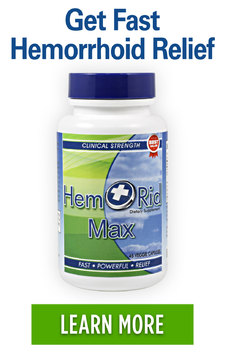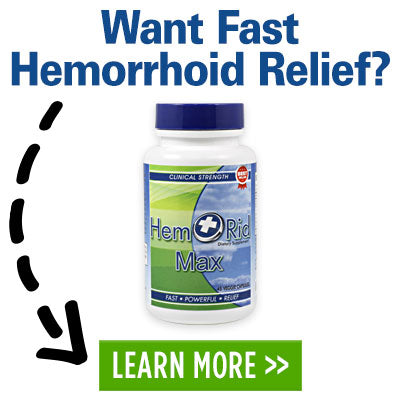A Guide to Running with Hemorrhoids: How to Survive as Hemorrhoid Runner
Posted on 04 July 2018 by Maryanne Johnson
Share this post
For runners, pain comes with the territory. Sore legs, muscle cramps, blisters, and chafing are all shared grievances of running, but these annoyances don’t seem to slow runners down. Hemorrhoids, however, can be a different story.
These disruptive clusters of veins and blood vessels aren’t a common side effect of running, but still seem to cause the same amount of pain and trouble as all of the other collective issues accumulated from running.
If you’ve never experienced hemorrhoids before, noticing their symptoms of pain around your anus, anal bleeding, and feeling uncomfortable in certain positions can send you into a panic.
The anal-rectal area is already a sensitive area, and so anything that appears or feels abnormal is going to be unnerving for anyone. However, runners should be aware that sometimes, exercise can cause inflammation in the rectal area.
Hemorrhoids are a widely occurring condition, but even so, any symptoms that crop up should be reported to your doctor. Certain factors like age and genetics could determine if your doctor would like to perform additional exams.
When movement can be uncomfortable, even during long and short jogs, what are you to do as a runner? Sometimes you hear that exercise makes hemorrhoids better, but you might have heard otherwise from elsewhere.
The relationship between hemorrhoids and exercise is complex, but with this guide, you will come out with a better understanding of what aggravates hemorrhoidal symptoms and the variables behind this inflammation.
Hemorrhoids and How They Happen
Running can aggravate and cause many conditions and issues, like arthritis, foot problems, cramping, and muscle soreness, but running does not cause hemorrhoids. Running with hemorrhoids can worsen symptoms of irritation and discomfort, but aerobic exercise is not a known cause.
Hemorrhoids, internal or external, can occur from a number of different reasons, but researchers and doctors are still unsure of the exact cause. Scientific evidence has indicated that if your parents or grandparents had hemorrhoids, then you are likely to get them as well.
Constipation, upset stomach, nausea, loose stools, and diarrhea are common symptoms experienced by runners either during their run or immediately following it.
In fact, diarrhea is found to be so frequently occurring for runners, that this state is often dubbed as “Runner’s Diarrhea." In a 2017 study that focused on gastrointestinal problems in runners, 10 out of 17 of the participants reported diarrhea and loose stools post-run.
Some of these issues can exacerbate hemorrhoids, like diarrhea and constipation. Abnormal stools, or stools that are hard and difficult to pass during a bowel movement, or loose stools, all can be irritants to already inflamed hemorrhoidal veins. And with Runner’s Stomach and Runner’s Diarrhea, this could further aggravate your hemorrhoids.
Runners may experience uncomfortable external hemorrhoids; a lump that can form on and around the anus that are sore, rubbery, and can emulate a throbbing or burning feeling.
Chafing that occurs during running can cause these external hemorrhoids to hurt more so, and if you are prone to having bowel issues post-run, this can also contribute to irritation.
Is Walking or Running With Hemorrhoids Okay?
As stated before, exercise has a contradictory relationship with hemorrhoids and can vary from person to person. The best answer to this frequently posed question is to talk to your doctor before running with your hemorrhoids, and this is primarily a good idea if you are marathon training or doing overly vigorous runs.
Long runs or particularly challenging runs should be discussed with your doctor if you have hemorrhoids. Jogging and walking are encouraged and promote healthy circulation that can shrink hemorrhoids more quickly.
Doctors will often advise avoiding excessively ambitious physical activities, especially those that involve lifting heavy objects. You will want to avoid lifting heavy objects because this puts additional and unneeded stress on your rectal veins, further inciting inflammation and resulting in hemorrhoids.
If you find that a strenuous run at a challenging pace is making your hemorrhoids worse, you can take a few precautions before heading out on your run to prevent this from happening.
External hemorrhoids, because they are hard lumps that form on the exterior of the anus, can make running unpleasant. As long as you are sure to lubricate your external hemorrhoids before running or jogging, you will help subside any irritating or hindering symptoms throughout.
By using hemorrhoid creams or ointments as a lubricant, you can prevent the throbbing, itching and burning of external hemorrhoids.
How to Run With Hemorrhoids
If you are likely to experience bowel problems following a run, or if you have painful external hemorrhoids, you don't have to give up running entirely to prevent these issues from further irritating your hemorrhoids.
For runners that frequently experience an upset stomach that results in diarrhea, take action to avoid this because it can worsen hemorrhoids. There are many methods for avoiding post-run diarrhea, and it can make a few trials and errors to find what works best for you.
Before running, ensure that you are properly hydrated and have not eaten a meal high in fat or processed foods. Sports drinks are recommended for consumption before and during runs.
Eating heavy meals before running is not advised, as this is likely to result in Runner's Stomach, and be sure to leave at least a two-hour window of time before your runs.
While fiber is essential in the prevention of hemorrhoids, you should avoid taking a fiber supplement, fiber gummy or eating high fiber foods if you find yourself getting diarrhea after running.
Avoid nuts, beans, and whole grains that are high fiber foods until after your run. This will help keep your colon regular and allow you to avoid Runner’s Diarrhea, along with preventing the aggravation of your hemorrhoids.
Lubricate your external hemorrhoids with hemorrhoid cream/ointment treatments before running. Not only will this prevent the symptoms of your hemorrhoids from being disruptive throughout the run, but it will also keep them from worsening.
When to See a Doctor
At your next appointment, be sure to explain to your doctor that you have been experiencing hemorrhoids and hemorrhoidal symptoms.
If you would like, try searching for a hemorrhoid physician or doctor.
You should visit your doctor sooner if you experience one or more of the following complications:
- Rectal bleeding
- When over the counter treatments are not effective
- If your hemorrhoids and their symptoms do not go away after a week or so
If you are around the age of 50 years or older, your doctor may want to perform other tests. A colonoscopy is a standard test for adults this age and one may be required of you if you have frequently occurring hemorrhoids.
Your doctor will work with you on both preventing and treating your hemorrhoids. He or she may recommend a stool softener or a fiber supplement to ease bowel movements and help regulate your colon.
Runners will need to be aware of using fiber supplements after their run, preferably a few hours later, as this can worsen Runner’s Stomach.
How to Treat Hemorrhoids From Running
As with any injury, soreness, or tension that arises from running, hemorrhoids should be treated with the same amount of care. While hemorrhoids can go away even without treatment, it is still essential for runners to tend to their hemorrhoids before they worsen, mainly if they chose to run while having hemorrhoids.
A few methods that help shrink hemorrhoids and promote their healing include:
- Fiber supplements and eating more foods high in fiber post-run
- Staying hydrated before, throughout, and after your run
- Knowing when not to push yourself to avoid worsening hemorrhoids
- Applying creams or ointments before and after your run
- Soaking in a warm bath or sitz bath to relieve swelling
Sometimes, for reoccurring hemorrhoids, doctors will advise a non-operative hemorrhoid treatment method that is more aggressive than over the counter hemorrhoid medicines.
This can involve a rubber band ligation, a standard and low-risk outpatient procedure that can rid you of your internal hemorrhoids in about three office visits.
By talking with your doctor, you can figure out a treatment plan for your hemorrhoids that will not intervene with your running.
You and your doctor can decide how to approach treating your hemorrhoids, either by adding a hemorrhoid supplement like HemRid Max or a stool softener like HemRid Fiber Gummies or for frequent hemorrhoids, a more serious approach.






0 comments